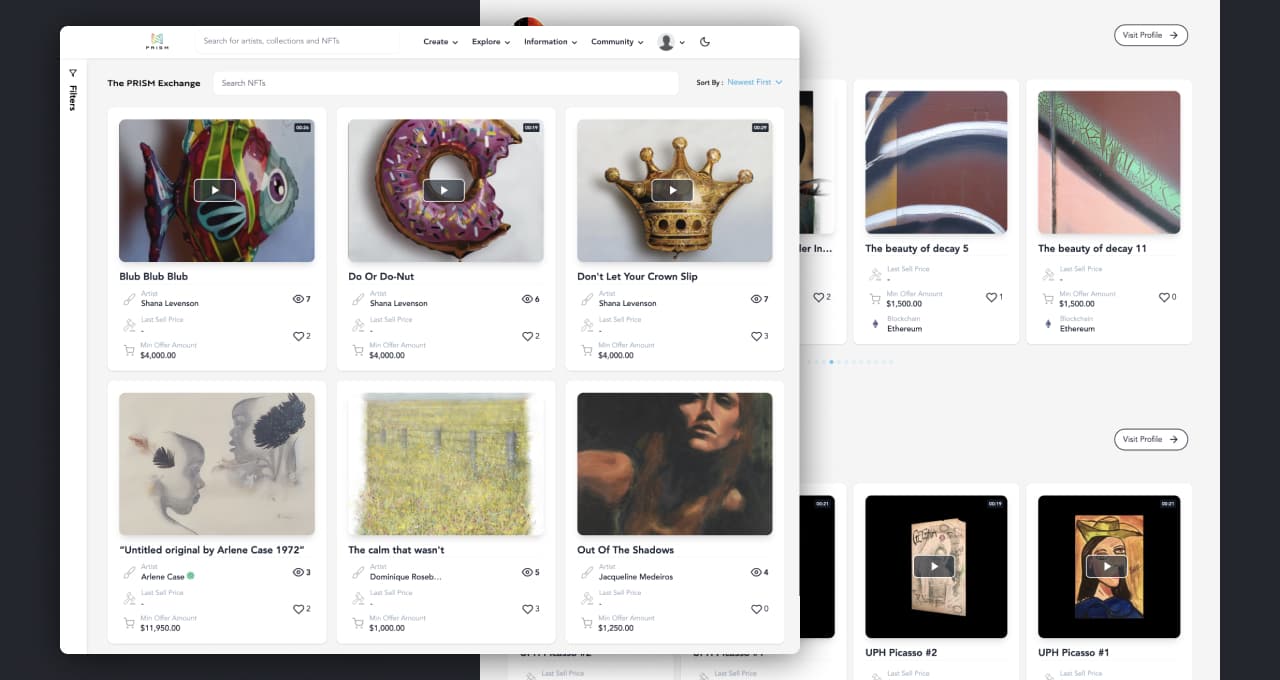
PRISM
Smart Contract Analysis and Security Check for the NFT Marketplace
- Blockchain
- Smart Contracts
- NFT
- Marketplace
- Art
- Security
- Blockchain
- Smart Contracts
- NFT
- Marketplace
- Art
- Security
- Home
- Success stories
- PRISM
About the client
NuPay Technologies is a blockchain corporation dedicated to creating innovative and sustainable products. The company aims to unlock the limitless potential of digital assets while having a minimal impact on the environment. One of the first steps towards their goals was the development of the PRISM NFT marketplace.Details
- Location:USA
- Date:2022
Client’s request
The customer wanted to make sure that their system was 100% secured on the smart contract side.
They wanted our team to:
- Analyze existing smart contracts on the NFT marketplace
- Detect bugs and identify security vulnerabilities
- Fix the errors and eliminate all possible issues
- Hammer down the Ethereum transaction mechanisms
- Enable highly secure transactions
- Ensure smooth user flow
The client also requested us to:
- Add a migration tool that would allow developers to update smart contracts with new features if the community is eager to do so
- Connect a Chainlink Oracle to the Ethereum blockchain that PRISM is powered by
- Do CI/CD preparations
- Add security filters
- Prepare environment architecture for development, staging, and production
Work done
Our blockchain professionals have analyzed PRISM smart contracts, identified key pain points, bugs, and vulnerabilities, and given advice on how to keep the platform running smoothly. We fixed all the issues detected and afterwards successfully passed a smart contract audit conducted by a third party.
Details
* The design of layouts was provided by the client.
User flow
We started our work by studying the project. It was especially important to keep the original user flow designed by the client.
Notably, the process of selling and buying NFTs on PRISM is done manually. Here is what it looks like:
- 1
The artist publishes their NFT and sets a starting price for it
- 2
Users evaluate the particular NFT and send their price proposals to the artist
- 3
The artist chooses who they want to sell their NFT to and accepts the offer
- 4
The artist receives the payment and sends their NFT to the buyer
Our tasks
Based on this user flow, our client gave us the following tasks:
Provide seamless user flow by allowing artists to collect payment and buyers to receive the NFTs they have purchased
Ensure the automatic return of NFTs and funds to their original state if one of the parties did not fulfill the conditions
Add a migration tool to be able to migrate the history of an existing contract to its updated version in case the community or the client wants to add new functionality or change the flow within the smart contract
Ensure that the tokens issued on PRISM could not be sold on other marketplaces as PRISM itself represents a secondary marketplace
Smart contracts and their role in the project
Smart contracts are at the heart of any blockchain-based application as they represent lines of code with transaction conditions embedded in them.
Essentially, they automate transactions, secure the application, and protect the user’s money. Smart contracts also eliminate the participation of any intermediary and the consequent loss of time.
Since large sums of money are transferred through or locked into smart contracts, they often become a target for hackers. Smart contracts should not therefore have any security vulnerabilities, otherwise users run the risk of losing their NFTs and funds — and the platform owner their reputation.
Got an idea? Let’s work together
How we worked on PRISM smart contracts
As the PRISM marketplace is currently running on the Ethereum blockchain, our developers used the Solidity programming language to fix and rewrite smart contracts.
Our team focused on three major points:
1
Security against hacker attacks and scams
Since buying and selling NFTs is done manually, this concept comes with security risks. We detected more than 20 minor/trivial problems in the initial code, which were preventing perfect optimization. We fixed them in order to secure smart contracts and thereby protect the platform and its users.
2
The correct operation of the user flow
We were asked to polish smart contracts to eliminate any possibility of malicious actions during the interaction between artists and buyers. We carefully analyzed the code and fixed it so that the parties could not cheat each other in any way.
For example, an artist receives an offer from a buyer and accepts it. The buyer sends their money to the artists, but there is no sign of the NFT for 48 hours. In this case, the buyer will receive their money back. If the artist sends their NFT to the buyer, but the buyer does not confirm receipt of the token, the buyer will receive their money back and the artist will still have their NFT.
Thus, smart contracts define and record every step that the buyer and seller take. If the conditions are not met, the smart contract will return everything to its original state and no one will lose anything.
3
The ability to resell NFTs only using the PRISM marketplace
We debugged and rewrote smart contracts in such a way that it is now completely impossible to sell NFTs issued by PRISM on any other marketplace.
Once the smart contracts were successfully corrected, they were audited by a third party company. No critical errors were found. Several problems were associated with the original architecture of the project. Other issues were resolved by our team.
Our process step by step
When working on our client's smart contracts, we followed these four steps:
Gathering requirements
- Understanding the core problems and goals of the project
- Analyzing client’s requirements
- Defining the scope of work
Initial analysis of smart contracts
- Bugs and issues research
- Approving the scope of detected problems and offering solutions
Correction of errors and bugs
- Code refactoring and optimization
- Adding new features and security coverage
Code testing
- Unit testing
- Testnet QA process
- Stress testing for preventing malicious actions
Results
The PixelPlex and NuPay Technologies collaboration on the PRISM NFT marketplace has been fruitful and has helped the client bring about meaningful transformation to their platform. The marketplace has been operating since February 2022, and our team is proud to have contributed to the project by auditing its smart contracts.
When working with our client, we fulfilled all their requirements, namely:
- Ensured the security of smart contracts and thereby the entire system
- Preserved and enhanced the original flow between NFT buyers and sellers
- Made sure that NFTs did not go beyond the PRISM marketplace
- Added a migration tool to enable easy updates of smart contracts in case the community asked for changes
Our work with NuPay Technologies will continue as we both strive to advance blockchain technology and make the world better through innovation.
Services
We offer a comprehensive range of services, including IT consulting, custom software development, and specialized expertise in blockchain, machine learning, and data science.
Blockchain Development
Blockchain Development
Smart Contract Development
Web3 Development
Blockchain Game Development
Crypto Payment Solutions
Tokenization Services
Protocols
Protocols
Cryptocurrency Exchange Development
Cryptocurrency Development
Marketplace Development
Dapp Development
DeFi Development
Top Development Company
Blockchain Consulting
Smart Contract Audit
Top Blockchain Consulting Company
Custom Software Development
Custom Software Development
Mobile App Development
Web Development
Top IT Services Company
IT Consulting
Top Consulting Company
ML Development
Artificial Intelligence Development
Machine Learning Development
Data Science Development
Top BI & Big Data Company
AR & VR Development
AR & VR Development
QA & Software Testing
QA & Software Testing Services
UI/UX DesignGive us the pleasure of adding our secret sauce to your app.
We’ll create beautiful screens at the front while breaking the limits of what’s behind them to help your app get to beyond-plausible business achievements.
UI/UX Design Services
MVP DevelopmentValidate your product idea quickly with an MVP—launch faster, test smarter, and refine based on real user feedback.
Leverage our expertise in MVP development to build a scalable, market-ready product with minimal risk and maximum efficiency.
MVP Development Services
Metaverse Consulting & Development
Top Development Company
Solutions
RWA PlatformTokenization makes it easier to trade assets and opens up new investment opportunities and diversifies portfolio.
RWA Platform
Asset tokenization platform development
Arbitrage BotProfit from market inefficiencies with automated, customized trading strategies that boost returns and minimize risk.
Arbitrage Bot
Be a transaction ahead. Catch profit at short notice
CryptoAPIGain an unfair data edge for your dApps. Tap into high-quality blockchain insights to outsmart competitors and fuel smarter decisions.
CryptoAPI
Connect your dApps to blockchain networks in a flash
OTC HawkOffer high-net-worth clients a secure, enterprise-grade trading terminal. Streamline deals, enhance reliability, and optimize top-tier crypto assets.
OTC Hawk
Benefit from our portfolio and wealth management app
DocFlowManage sensitive documents on blockchain. Leverage optional zero-knowledge proofs for trust, privacy, and streamlined workflows.
DocFlow
Intuitive Blockchain-Powered Document Management System
Know-Your-TransactionEnsure every transaction is above board. Monitor digital asset flows for compliance and transparency, supporting both businesses and regulators.
KYT crypto platform
Our KYT platform fosters integrity of financial ecosystems
Industries
We work across a variety of industries, from FinTech to eCommerce, leveraging our accumulated knowledge and best practices to deliver solutions tailored to the unique needs of your business.
FinTech & BankingAs traditional finance goes digital, we are committed to building efficient ecosystems and better engagement.
Think of customized FinTech solutions with tamper-proof transactions and storage, progress transparency and automation — and we’ll make them see the light of day.
$25T
Global Financial Services
20%
Digital/Blockchain Growth
Solutions for FinTech & Banking
PaymentWe build secure and seamless payment software solutions that increase revenue, reduce friction, and scale with your business.
If you're integrating payments into your platform and need a team with deep financial technology expertise, we'll help you engineer transactions with precision and reliability.
$9.5T
Global Digital Commerce Value
30%
Growth in Embedded Finance
Payment
Retail & eCommerceWhether you market B2B or B2C, commerce tech trends are all about value-driven purposes, global sustainability, hybrid shopping journeys, and extra-resiliency.
Let your clients know that there’s more to your brand than meets the eye by creating unique customer experiences in all your stores.
$6.3T
Global eCommerce
10-15%
Tech Innovation Growth
Solutions for Retail & eCommerce
Supply Chain & LogisticsTo make things easier for all vendors, we deliver apps for route and cost optimization, vehicle operational support, and better dispatch time efficiency.
With focus is sustainability, resilience, transparency, and immutability, let’s get your transformation going.
$10T
Global Logistics
15-20%
Blockchain Adoption Growth
Solutions for Supply Chain & Logistics
HealthcareCustom healthcare software solutions are aimed at helping you ensure accurate diagnosis, better patient engagement, and positive healthcare outcomes.
Whether you require a patient management solution, practice management software, EMR/EHR system, or ML-enabled diagnostics – we’ve got you covered.
$10T
Global Healthcare
20%
Digital/Blockchain Growth
Solutions for Healthcare
Real EstateKeep up with digital innovation trends by accelerating enterprise transformation and scaling, leveraging data and orchestrating workflows.
Whether you manage and sell commercial facilities or invest third-party capital, our integrated solutions help you make the most of it.
$340T
Global Real Estate
15%
PropTech/Blockchain Growth
Solutions for Real Estate
Oil & GasWith mobility and digital technologies standing to change the game and define leadership, our mission is to get you digital-first.
Resolve operational and conceptual issues by introducing clear tech vision, feasible architectures, and flexible software to take business extension off limits.
$4T
Global Oil & Gas Industry
10-15%
Digital/Blockchain Growth
Solutions for Oil & Gas Industry
InsuranceImagine a world where quoting policies, processing claims, and managing mountains of paperwork are effortless. PixelPlex can help you achieve just that.
Break free from outdated systems and focus on what truly matters – delivering exceptional service to your policyholders and growing your insurance business.
$25T
Global financial services
20%
Digital/blockchain growth
Solutions for Insurance Industry
FitnessWe create custom fitness software solutions that support meaningful training and steady engagement from the first session.
If you’re building a digital product for active users and need a team with real project experience behind it, we’ll help you bring it to life with clarity and purpose.
$257B
Global Fitness Industry
24%
Digital Growth
Solutions for Fitness
BankingFinancial systems face continuous change and ongoing scrutiny throughout their lifecycle as products evolve.
Our solutions are designed to stay predictable under regulatory oversight and daily operational load, helping teams build systems they can rely on.
$191T
Global Bank Assets
62%
Digital Payments Use
Solutions for Banking
RestaurantCustom restaurant management software allows for reducing costs, smooth internal CRM and delivery systems integration, and easy scalability.
We develop restaurant ecosystems that turn your complex business data into actionable insights that the whole team can understand and use.
$4.2T
Global Food Service Market Value
+7.2%
Annual Growth Rate
Solutions for Restaurant
TravelCustom software development for travel helps agencies to get rid of fragmented operations and make decisions based on data, and with an aim of future growth.
We offer travel software solution development services that transform internal operational data into clear, actionable insights that the whole team can use.
$9.5T
Global Travel & Tourism Market Value
+5.8%
Annual Growth Rate
Solutions for Travel
Success stories
Domain
Industry
Protocols
Company
About us Team Careers Social Responsibility ContactsBlog
Blockchain Big Data Artificial Intelligence AR/VR Mobile News View Blog


